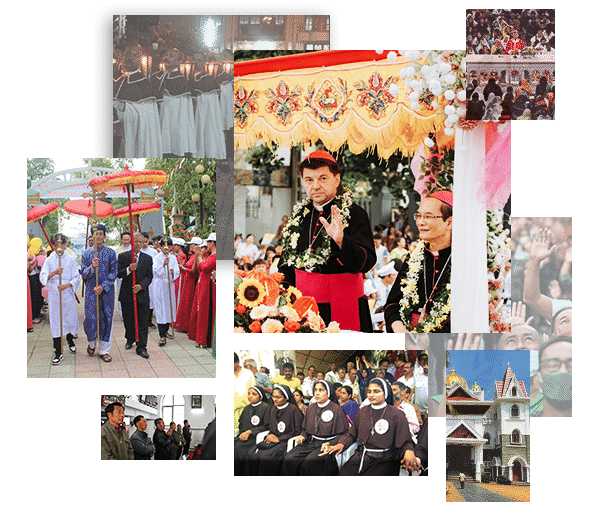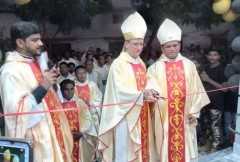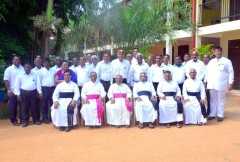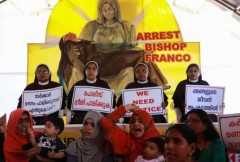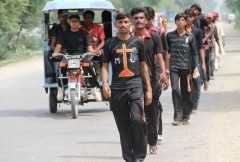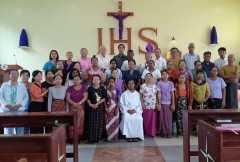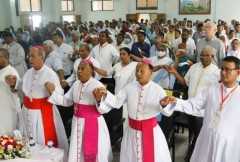Clericalism disheartens Catholics in Vietnam
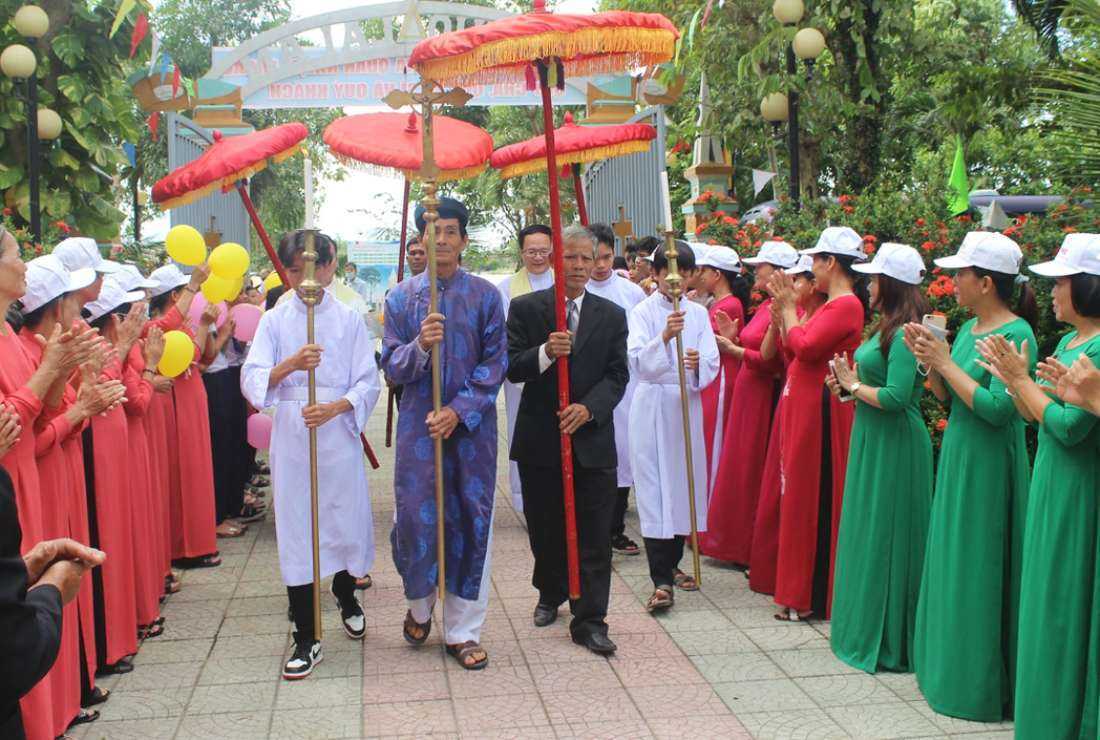
Catholics welcome a priest assigned to their parish in Hue in October 2022. (Photo: UCA News)
Simon Thien, who is in charge of his parish’s liturgical services, says most of the parishioners fear their priest more than God, and also feel disrespected by him.
The sexagenarian lay leader said the authoritarianism, monopoly and dictatorship of their priest, who is younger than him, poses various obstacles in the spiritual progress of the parish based in the northern central diocese of Ha Tinh, which covers the two provinces of Ha Tinh and Quang Binh.
“His contempt for lay people also suppresses the faith life of local Catholics,” Thien adds as he recalls the latest episode of the priest’s unpredictable behavior.
For the Easter Vigil in April, Thien and other parish council members were “ordered” by the parish priest to sell candles to local people.
The candles were supplied by the priest but the intention behind their sale wasn’t disclosed to the council members.
Since they were busy themselves, Thien and the others requested that their relatives and close friends sell the candles.
But when they went to hand over the money to the priest, he appeared piqued.
“He was angry with us for not informing him about the replacements and retaliated by violently stuffing the host into our mouths during Mass,” the lay leader told UCA News.

Vietnamese bishops are driven in procession to Ke Sat Church in Hai Phong diocese to celebrate the 120th anniversary of Ke Sat Council in December, 2020. (Photo courtesy of giaoxukesat.com)
Such irrational actions, unbefitting a priest, though did not come as a surprise to the parish council members and also Thein.
“He often gets drunk and shouts at people in the parish while referring to them as arrogant and ill mannered in his homilies,” he said.
The parish council tried suggesting the priest give up drinking but it had no effect.
“We never see him realize the error of his ways. He considers himself a great teacher and sends us on errands," Thien said.
The council members, who serve the parish voluntarily, say there is little they can do given their positions.
Father John Nguyen Ngoc Nam Phong isn’t surprised by such behavior of priests.
“Clericalism discourages evangelization work, destroys the Church life, sets bad examples for others, loses trust and respect from people, and makes people abandon the Church,” he said.
Clericalism, he says, is particularly prevalent in Vietnamese society, which continues to be influenced by Confucianism, instilling undue reverence for authority.
Phong said the structure of the local Catholic Church is like a monarchy, so people excessively adore and respect people with holy orders.
The Redemptorist priest, who is based in Ho Chi Minh City and holds parish missions and retreats in many parishes, said it is quite “normal” for a priest to smack children and exclude people from an association because he is annoyed with them.
In many parishes, Catholics are banned from attending wedding celebrations of those who fail to hold their wedding in churches, he added.
Phong also observed that many priests, who have limited intellect and are unable to handle their parishes, resort to extreme actions like refusing to administer sacraments as a way to show their power and hide their inabilities.
The observations made by Phong appear true while speaking to Luke Nguyen Dung, head of a parish council in Hue archdiocese in central Vietnam.
He says local Catholics believe it is their moral duty to unquestioningly obey priests who are given holy orders and are seen as their superiors.
“We hold our priests in considerable respect and treat them like royal family members and mandarins in the past,” he said.

Cardinal Peter Nguyen Van Nhon and Archbishop Joseph Nguyen Chi Linh are welcomed to Ke Sat Church in Hai Phong diocese in December, 2020. (Photo courtesy of giaoxukesat.com)
People in Thua Thien Hue province, which was home to Vietnam’s Nguyen dynasty (1802-1945), still follow the standard practices of the court.
They stick to established customs of receiving visiting bishops and priests. They dress in costumes, march in processions, play trumpets and drums, wave flowers and flags and cheer the visitors, he explained.
“This is a solemn ritual followed by people to show their respect to clergymen,” Dung said.
Noting that people reverently greet clergymen and religious by bowing down before them, Dung said that “they pay great respect to priests, and conversely, demean themselves.”
In many rural parishes, people who want to meet their parish priests at the parish houses are accompanied by lay leaders. They treat priests with betel nuts and wine according to set ritual, apologizing to them for their wrongdoings, or inform them about their child's forthcoming wedding or construction of a new house.
Mary Magdalene Ha from a parish in Ha Tinh diocese said her parish priest scoffs at parish council members’ ideas on parish activities.
Ha recalled that two years ago they nominated a good woman who has leadership qualities to replace the current head of the parish council, who was separated from his wife. The priest opposed their nomination saying that the parish council heads are only men, not women.
“The priest still lets him serve the parish council,” she said.
The head of the Good Mothers Association based at the parish said according to the diocese's parish council regulations, council members work with parish priests to develop pastoral plans and to work out practical methods for going ahead with them.
“But in reality, it is the priests who draw up all pastoral plans and ask the lay people to stick to them,” she noted.
Ha said the pastors need to be gracious and open-hearted. They should respect and listen to the community members' voices in pastoral programs that are ultimately for the community's own good.
“Since the parish is a family, the priest is called the father who serves his children who are lay people. The family is happy only when both sides respect, love, show real gratitude to one another, and live together in unity,” she said.
Ha also felt that priests should enable women to participate in parish activities “as men and women are equal before God and in the Church.”
A retired priest from Hue archdiocese admitted that he used to humiliate an elderly woman in front of other people when he served a parish a decade ago.
He recalled scolding the good woman who was older than him for missing a Sunday Mass, but she said nothing.
“Two weeks later she apologized while clarifying that she had gone to confession. I felt really awful about my impatience and did apologize to her most humbly,” said the octogenarian priest, who asked not to be named.
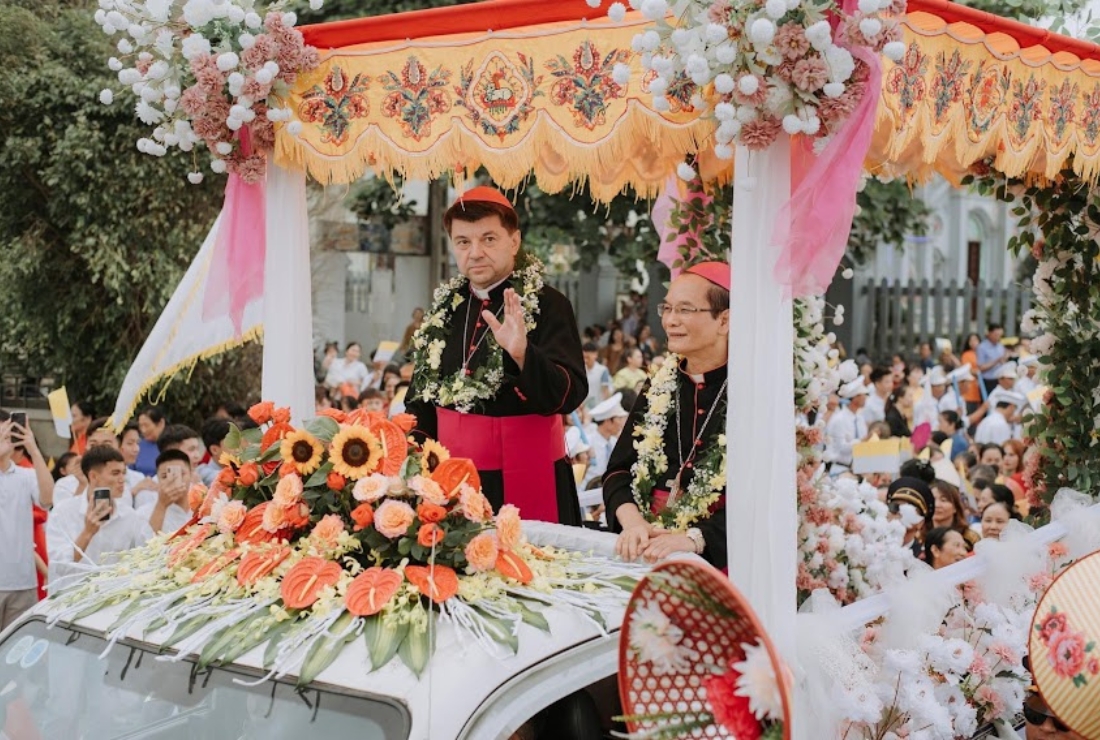
Vatican envoy Archbishop Marek Zalewski (left) and Bishop Joseph Nguyen Duc Cuong of Thanh Hoa are driven in a lavishly decorated vehicle on May 14, 2023 at Ba Lang Church in Thanh Hoa province. (Photo courtesy of giaophanthanhhoa.net)
Local priests, who are considered lords in parishes, are sorely tempted to abuse power and finances.
"Priests must think that people give them money for pastoral activities, not for their personal expenses," he noted while stating the fact that many of them live a very lavish lifestyle.
To achieve parity between clergymen and the laity, he felt that, “priests must live a humble life, eat crow, serve people as shepherds, not officials, and do not use God's Word and their own authority to intimidate them.”
Thien regretted that many faithful end up giving up the faith practice due to the attitude and behavior of priests.
“As a result, many lay associations are disbanded, the community's religious activities are suspended, and community members are divided, fighting with one another, competing for power between the priests' supporters and opponents,” he said.
Some communities clash with their priests and file applications to bishops asking for their transfer.
Priests and Religious are from the laity, so they need to be grateful to them and serve them with fraternal love and respect, he said.
Phong said to alleviate clericalism, the Church needs to improve its management model by treating the laity as the root.
“Lay people should manage parishes and finances, and priests provide only pastoral care for them and receive salaries,” the Redemptorist priest said.
He noted that in doing so, fewer youngsters will pursue religious vocations in the future since many want to be priests to have a better life, be held in considerable respect, and have power over people.
“However, quality is better than quantity if the Church wants to be a community of love, fraternity and charity,” Phong said.



Publisher
UCA News





